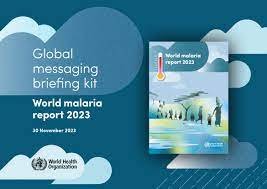World Malaria Report 2023: Malaria Cases Surge to 249 Million in 2022, 16 Million Above Pre-Pandemic Levels
The World Malaria Report 2023 has revealed alarming statistics, indicating a surge in malaria cases to a staggering 249 million in 2022. This surge represents a significant increase of 16 million cases above pre-pandemic levels, raising concerns about the global fight against this deadly disease. Malaria, a mosquito-borne illness caused by Plasmodium parasites, continues to pose a severe threat to public health worldwide.
The report, released by the World Health Organization (WHO), underscores the impact of the COVID-19 pandemic on malaria control efforts. The disruptions in essential malaria services, including prevention campaigns and access to treatments, have contributed to this drastic rise in cases. It highlights the need for concerted efforts and renewed strategies to combat malaria effectively.

Why this News is Important:
Impact on Global Health Strategies
The surge in malaria cases, as reported in the World Malaria Report 2023, significantly impacts global health strategies. It highlights the repercussions of the COVID-19 pandemic on malaria control efforts, emphasizing the urgent need to reevaluate and reinforce healthcare initiatives.
Pandemic Disruptions and Malaria Control
The report underscores how disruptions caused by the pandemic, such as limited access to healthcare services and preventive measures, have fueled the resurgence of malaria cases. Understanding these disruptions is crucial in devising effective strategies to address the current challenges.
Historical Context:
The history of malaria spans centuries, with the disease affecting populations across continents. Malaria has been a persistent public health challenge in tropical and subtropical regions, predominantly impacting low-income countries. Efforts to control malaria date back decades, with the introduction of interventions like insecticide-treated bed nets, indoor residual spraying, and antimalarial drugs.
Over the years, significant progress has been made in reducing malaria-related deaths through concerted efforts by global health organizations and governments. However, the emergence of drug-resistant strains of the malaria parasite and challenges in accessing remote areas have hindered eradication efforts.
Key Takeaways from “World Malaria Report 2023”:
| Serial Number | Key Takeaway |
|---|---|
| 1. | Malaria cases surged to 249 million in 2022. |
| 2. | The increase is 16 million more than pre-pandemic levels. |
| 3. | COVID-19 disruptions contributed to the rise in cases. |
| 4. | Urgent need for revitalized malaria control strategies. |
| 5. | Global collaboration crucial for malaria eradication. |
Important FAQs for Students from this News
Q: What is the primary cause behind the surge in malaria cases according to the World Malaria Report 2023?
A: The primary cause is attributed to disruptions in essential malaria services triggered by the COVID-19 pandemic.
Q: How many malaria cases were reported in 2022, as per the report?
A: The report indicates a surge in malaria cases to 249 million in 2022.
Q: What impact did the pandemic have on malaria control efforts globally?
A: The disruptions caused by the pandemic, such as restricted access to healthcare services and preventive measures, contributed to the rise in malaria cases.
Q: What are the key strategies highlighted in combating the resurgence of malaria cases, as mentioned in the report?
A: The report emphasizes the need for renewed strategies, including adequate funding, innovative healthcare approaches, and community engagement.
Q: Why is international collaboration crucial in the fight against malaria, according to the World Malaria Report 2023?
A: Collaborative efforts among nations, health organizations, and communities are vital to effectively combat the global resurgence of malaria and achieve the goal of eradication.
Some Important Current Affairs Links














